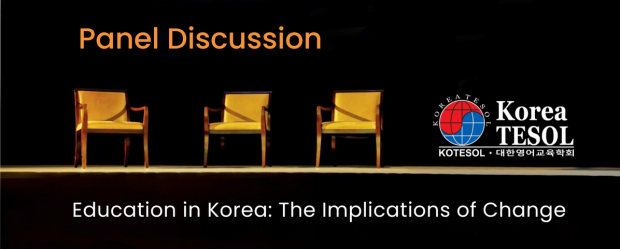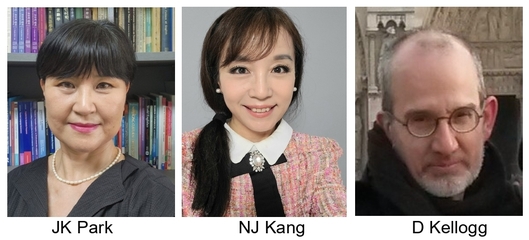
Featured Panel Discussion @ KOTESOL 2024
Topic: Education in Korea: The Implications of Change
In an era marked by swift and accelerating change, the landscape of education, particularly in the realm of teaching and learning English as a foreign language, is poised to undergo even more rapid transformations. Acknowledging the inevitability of change, this moderated panel aims to explore the influence that advancements in technology and innovative teaching methodologies may project onto education and its policies. With a primary focus on unraveling the implications for the educational landscape in Korea, our three-member panel will engage in an insightful conversation. Attendees will also have the opportunity to pose questions, fostering an interactive and collaborative exploration of the evolving facets of education in our rapidly changing world.
The Panelists

Joo-Kyung Park, PhD, has recently retired from the Department of English at Honam University in Gwangju, South Korea. She has had a very active and versatile career as ELT professional through many leadership and service positions at her university, in the local community, and through professional organizations. Her research interests include teacher education, critical pedagogy, English as a lingua franca, intercultural communication, and as a recent addition, teacher well-being. Dr. Park has frequently been invited to deliver keynote, plenary, and featured talks at ELT conferences held both within and beyond Korea. She has served as the journal editor-in-chief for Korea TESOL and the Global English Teachers’ Association, and as an editorial board member of several Korean and overseas journals. Dr. Park was president of Korea TESOL (1996–1997) and the Applied Linguistics Association of Korea (ALAK; 2015–2016). Currently, she serves as the co-president of the Asian Association of Teachers of English as a Foreign Language (AsiaTEFL; 2022–2024).
Nam-Joon Kang, currently the head of the TESOL MA and SMU-TESOL Certificate programs at Sookmyung Women's University, received her PhD from Leeds University in the U.K., focusing on analyzing video and paper textbooks with young learners. For more than 20 years, she has been interested in developing ELT text materials for young learners and daily English television programs for kindergarten and elementary school learners at several broadcasters, including EBS, KBS, and SBS. Currently, she is very interested in areas such as edutech-enabled learning, drama-based activities, creativity, child psychology, and therapeutic approaches. Dr. Kang is presently working on several projects related to the effectiveness of using coding robots in the language and affective domains of kindergarten EL learners and the psychological aspects of learners and teachers on learning and education.
David Kellogg has an MA (distinction) in applied linguistics from the University of Essex and a PhD (vice-chancellor award) in general linguistics from Macquarie University. He has taught English in North Africa, the UK, and China, and he is currently an assistant professor in English education at Sangmyung University. Prior to Sangmyung, Dr. Kellogg taught at Hankuk University of Foreign Studies and Seoul National University of Education for fourteen years. Since coming to Korea in 1997, he has written over seventy articles in peer-reviewed scholarly journals, mostly on the nexus between Vygotsky’s cultural-historical psychology and Halliday’s systemic-functional linguistics. He is the translator, with Nikolai Veresov, of four volumes of L. S. Vygotsky’s pedological works (Springer Singapore, 2019–2024). He has also published fifteen volumes of Vygotsky’s work in Korean (Salimteo/살림터, 2010–2024). He is currently participating in research groups in Korea (translating Vygotsky’s work), China (analyzing Chinese texts), and Australia (training primary school teachers).
![]() Return to Invited Speakers webpage.
Return to Invited Speakers webpage.
![]() Return to International Conference frontpage.
Return to International Conference frontpage.



